Inter-American Division Spearheads Efforts to Reach Urban and Secular Communities
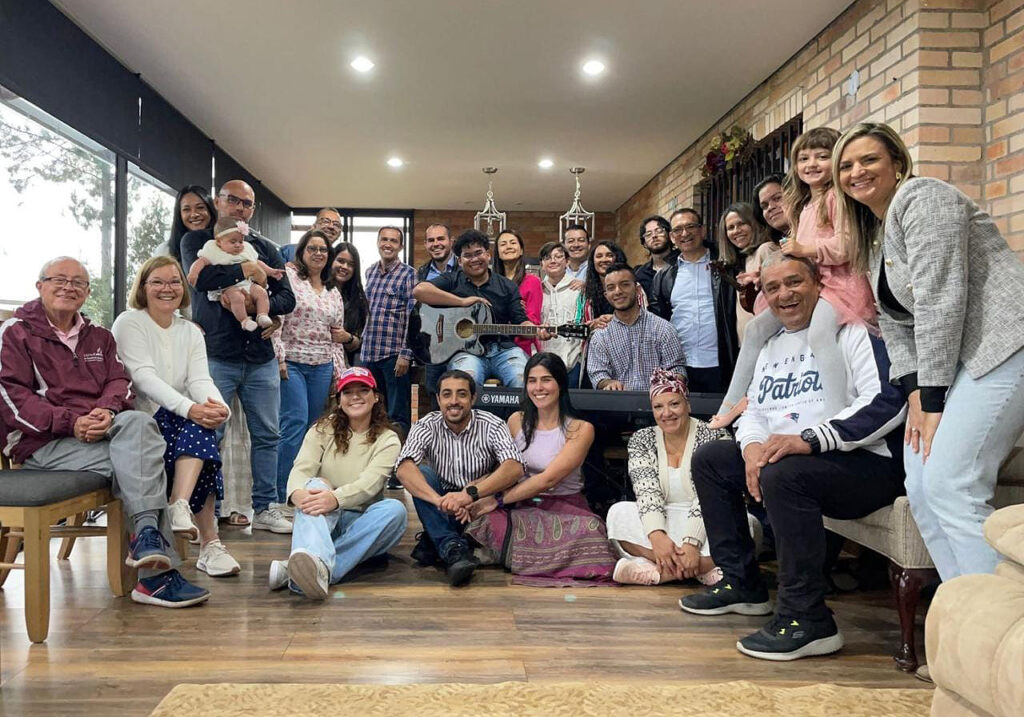
A group from the Comunidad Oriente (Eastern Community) sit together for a group photo at their rented Hacienda in Medellin, Colombia, during a recent Sabbath afternoon. The group led by Pastor Kevin Mendoza leads a core group of Seventh-day Adventists and business owners in the area who congregate each week as part of the Inter-American Division’s project of 10 congregations aimed at reaching secular-minded individuals with the message of the gospel. [Photo: Courtesy of Kevin Mendoza]
New Seventh-day Adventist congregations are becoming more visible across the territory of the Inter-American Division (IAD). Congregants are gathering in spaces unlike a church building. The worship service format is not the usual one with a Sabbath School and divine worship program in the morning. There are no church emblems or even the Seventh-day Adventist Church logo. There is music, there are Bible-centered messages and specific activities and events on the Sabbath and during the week.
The groups or small congregations are managed by the Adventist Church in the specific conference or mission in the union they serve across the territory. Coined as Friendly Churches, the congregations planted follow a plan launched in 2021, when division leaders decided to reach non-believers in specific locations across urban areas.
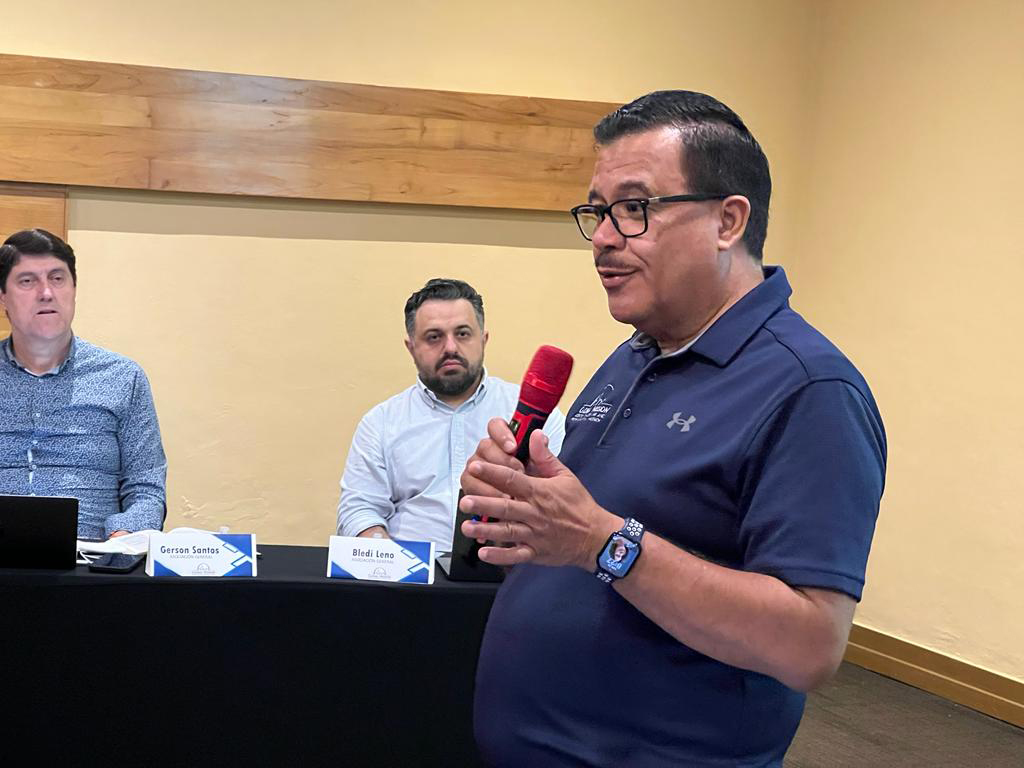
Pastor Hiram Ruiz, public campus ministries director of the Inter-America Division leading “Friendly Churches” speaks to the group of pastors appointed by their conferences and Unions to head the unique congregations in large cities in the territory. [Photo: Libna Stevens/IAD]
“We call them ‘Friendly Churches’ because these are friendly congregations for secular-minded people,” said Pastor Hiram Ruiz, public campus ministries director of the IAD overseeing university students and young professionals. “It’s not to say that our Seventh-day Adventist Churches aren’t friendly, but it’s a reference we use internally to describe a new space or place to share the message of hope to a specific audience the church has shied away from seriously pursuing.”
Friendly Churches seek out university students, business owners, professionals, and persons who are not interested in visiting a church building or taking part in a formal church service. They are not interested in organized religion, Ruiz said. It came about after the pandemic, highlighting the need to reach believers and non-believers uninterested in any kind of religious church, Ruiz added. “We saw the need to provide a comfortable place where they could speak and listen to spiritual things, without music being the main focus, a specific dress code, but with the opportunity for them to understand God in their lives.”

Front L-R: Instructors Pastors Gerson Santos, ministerial association associate director of the General Conference, Bledi Leno, director of the Global Mission Urban Center; Hiram Ruiz of the Inter-American Division; Kleber Gonçalves, director of Global Mission Center for Secular and Postmodern Studies at the General Conference; and Johnathan Contero (until recently, pastor at Iglesia Cero in Madrid, Spain), are surrounded by appointed pastors leading a Friendly Churh in a large city throughout the territory [Photo: Libna Stevens/IAD]
It began as a pilot program
“The project started as a pilot program with unions, or major church regions, that wanted to create a more sensitive and comfortable space to the specific interests of the target audience, less structured worship services, and with ongoing activities and community projects,” Ruiz said.
Fifteen groups began from ten unions in the IAD with an appointed pastor selected by the corresponding conference, who for a year, was trained in a series of in-person and online sessions and enlisted a core-group of approximately 20 interested church members in the project. Later, the group of pastors designated to lead a Friendly Church met to continue specific training, discuss progress reports and challenges in their new ministry, and be laser-focused on the task of connecting secular-minded individuals to the message of the gospel.
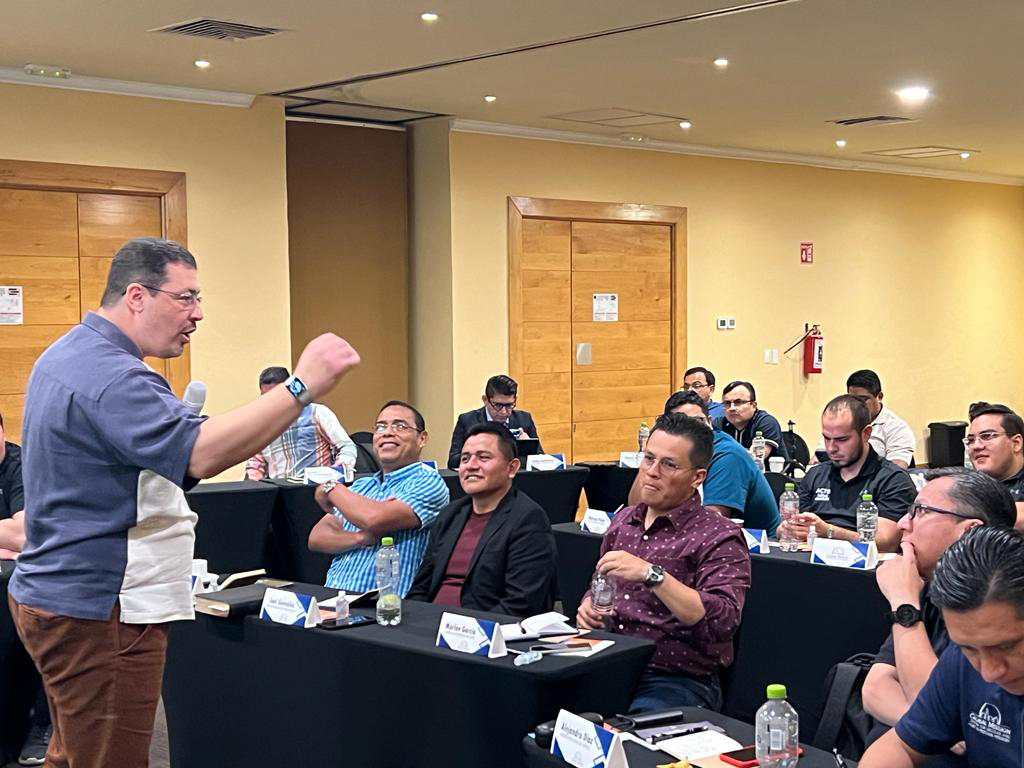
Pastor Kleber Gonçalves, director of Global Mission Center for Secular and Postmodern Studies at the General Conference speaks durign a training session of Friendly Churches leaders earlier this year.[Photo: Libna Stevens/IAD]
A different approach
The IAD was the first region of the world church to participate in the new structured program, said Pastor Kleber Gonçalves, director of Global Mission Center for Secular and Postmodern Studies at the General Conference.
“This has been a totally different approach from what pastors have been trained for normally in our church,” Gonçalves said. “The process of leading others to Christ could take longer than church leaders or members expect in a traditional Adventist Church setting but so far it has proven to be effective, and we have seen how God has grown the ministry of seeking secular-minded people who are looking for answers and are interested in making a difference in the world throughout Inter-America,” he said.

Pastor Misael Pedraza speaks to a core group of the Hope Life Congregation in the northeastern part of Monterrey in Nuevo Leon, Mexico. [Photo: Facebook]
Pedraza, like other pastors in the Friendly Church Project, focuses on ministering to Hope Life congregants and his core group of church members. They have embraced the specific long-term vision of the project and understand how secular-minded people in the region think and act.

Hope Life announces on Facebook that they live a life of hope, study the Bible, music and messages at their rented space in the Akadem building in Monterrey, Mexico. [Photo: Hope Life Facebook]
Working in core groups
The core group meets every Sabbath morning to study the Sabbath school lesson, to pray, worship and go over the friendly church’s vision and purpose in the mission. Then the core group welcomes the congregants for the Sabbath afternoon service which includes moments of praise, a spiritual message, and time to snack together. “It’s important to be inclusive — a congregation that has a fresh approach to engage individuals in serving the community through a ministry or project,” Pedraza said. The key has been providing different interests groups and ministries visitors can be part of. Several have been baptized and the group has grown to more than 100 people.
Not far from Hope Life is CREA, a Friendly Church in the northwestern part of Monterrey. Pastor Alejandro Díaz leads CREA. He has seen the benefits of welcoming everyone who comes through the doors on Sabbath afternoons for worship. “We focus on connecting and making friends no matter how they look or what they do, without judgement,” Díaz said. “We give them a chance to take part in any of the ministries that they may want to be part of such as branding experts group, marathon runners, tech or engineers, women bringing about awareness on issues of violence, and more.”
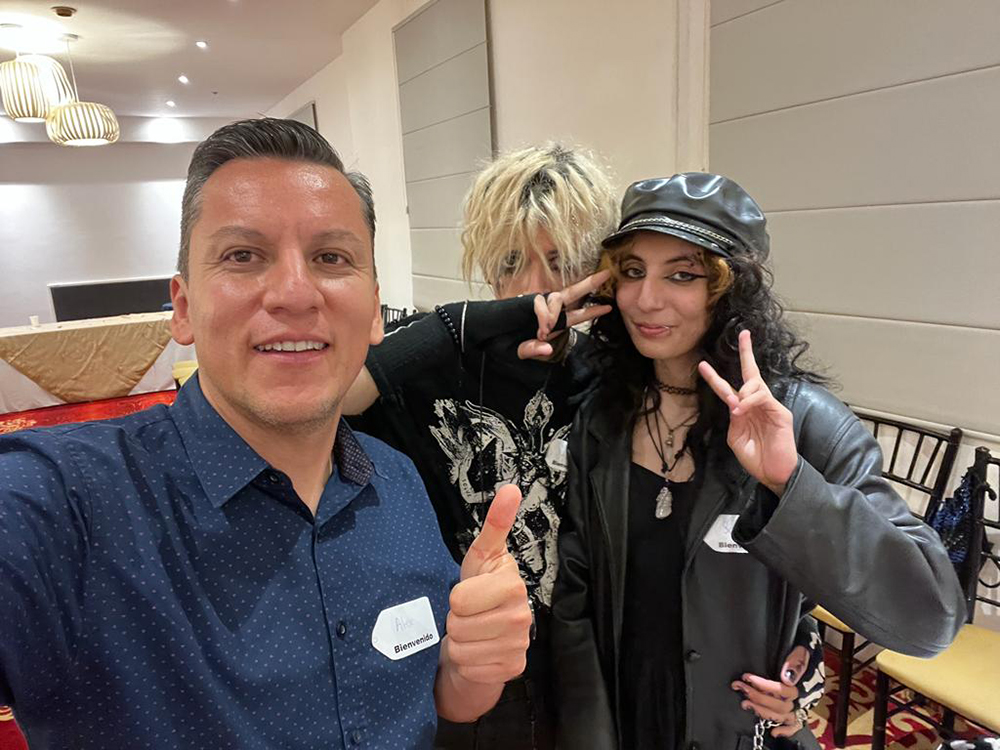
Pastor Alejando Díaz who leads CREA group takes a selfie with two young people who take part in the services and activities of the group. One of the objectives of the core group is for everyone who joins always feels comfortable and welcome. [Photo: Courtesy of Alejandro Díaz]
Díaz served as a district pastor for more than 20 years and said leading the new format has opened so many opportunities to understand better the needs and concerns of each secular mind that approaches CREA. “The message of the gospel doesn’t change but the methods we are using to connect with this generation and seems to be drawing many more young people, professionals, and business owners who are searching for something greater than what they have,” he said. There are more than 60 people meeting at CREA every week.
An ongoing discipleship program
Each of the Friendly Churches established is in a large city populated with at least one-million people. Basically, the churches have been designed to be a different kind of Adventist Church, with an ongoing discipleship approach, said Ruiz. “It has been wonderful to see the spiritual impact these congregations are making in the lives of so many living in large cities,” he added.
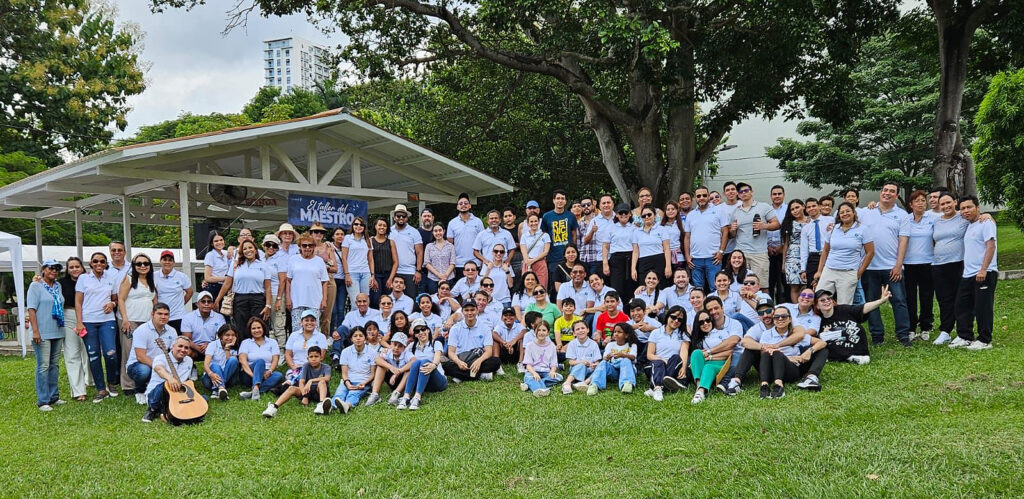
The Conexion 7 congregation in Panama City, Panama, gather for a special training and social activities at a park recently. The group has grown to more than 150 persons who meet every Sabbath. [Photo: Courtesy of Demetrio Aguilar]
“Many of our young generations and secular individuals can’t understand the format our Adventist churches do each Sabbath. They have a difficult time sometimes feeling comfortable with church liturgy that seems foreign to them,” he said. It’s a different approach, but after months, they have been able to see positive results. “Many have decided to join the groups through baptism and continue active in mission initiatives and projects,” said Ruiz.
In Panama, Conexión 7 opened last year with a group of business professionals who reside in upper-class communities in Panama City. From the start, Pastor Demetrio Aguilar was clear about their goal. “It’s been all about establishing a friendship, a connection with business owners and professionals,” Aguilar said. “We seek to offer them an encouraging spiritual message, to draw them to engagement and growth.”
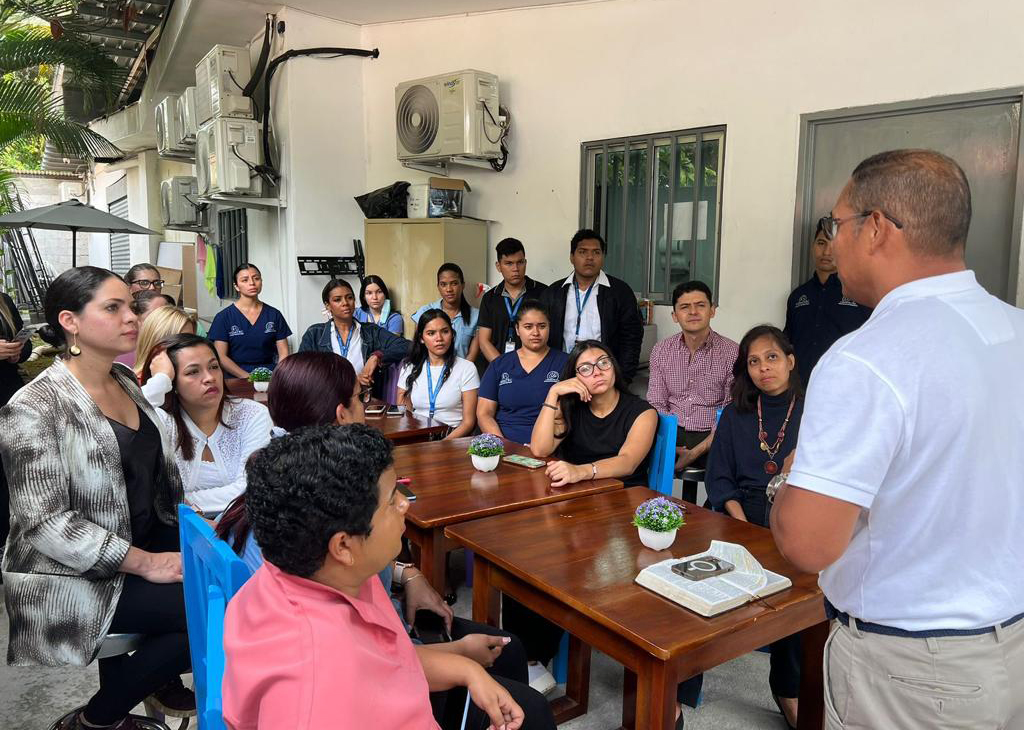
Pastor Demetrio Aguilar who leads Conexion 7 in Panama City, Panama, meets with a group of business owners to share a biblical message. [Photo: Courtesy of Demetrio Aguilar]
The initiative has convinced Pastor Jose De Gracia, president of the Panama Union, of how effective is the Friendly Church’s format. “It has been such a blessing,” said De Gracia.
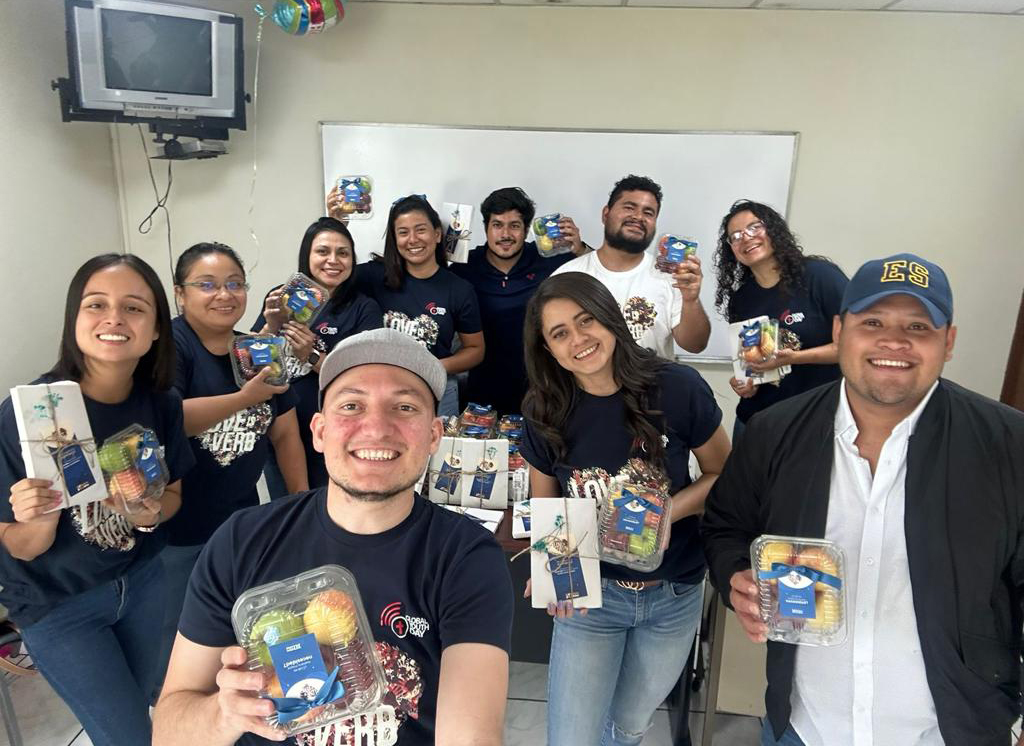
Group from Before & After congregation in San Salvador, El Salvador hold a packaged snacks they will distribute during a community impact activity in the community. [Photo: Courtesy of Johnatan Peñate]
Kevin Mendoza worked for months to reach a group of property owners in the eastern outskirts of Medellin, Colombia. The group, called Comunidad Oriente (Eastern Community), gathers more than 50 business owners in a rented estate not far from the city every Sabbath. During social gatherings and activities, they take time to plan. The group continues to bring friends and acquaintances to engage in their weekly gatherings.
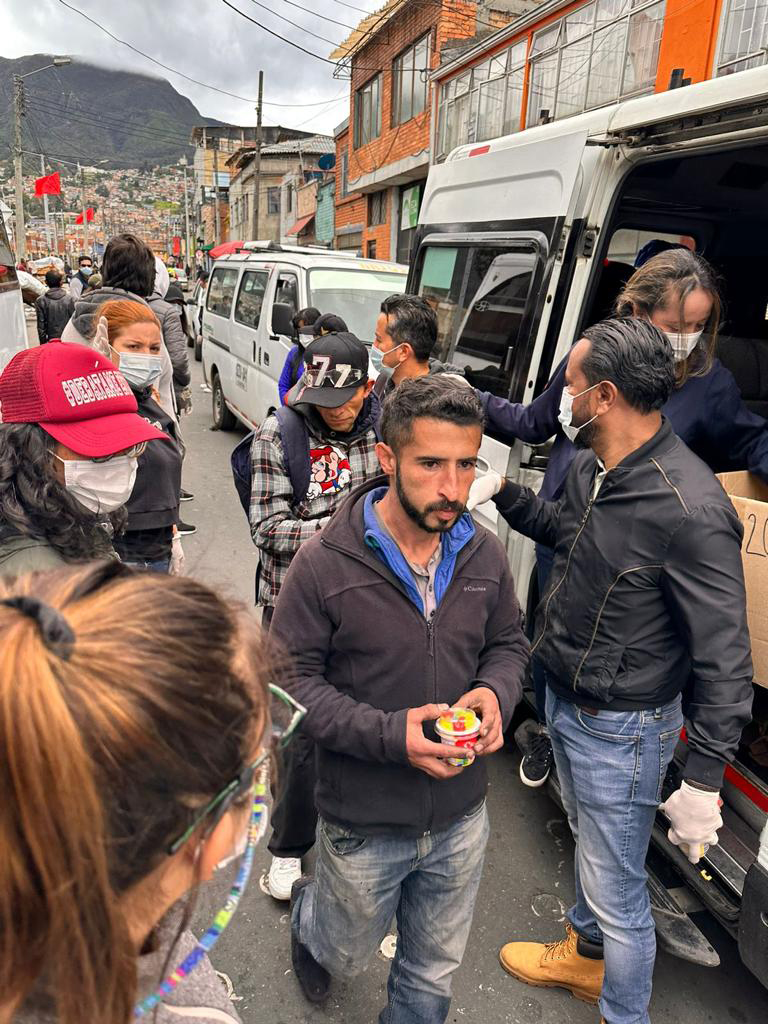
A group from “Tercer Lugar” led by Pastor Jonatan García one of two “Friendly Churches” congregation in Bogota distributes snacks to a group of homeless individuals in during a recent community impact activity. [Photo: Courtesy Jonathan Garcia]
The success of the Friendly Church project is not being measured by the number of baptisms, visitors, and regular visitors, Ruiz said. “The connections, the spiritual growth of the group works through a contextualized discipleship program, not your traditional Adventist evangelism format,” he said. Yet, the groups at Friendly Churches understand the principles of stewardship, give their tithes and offerings, and contribute to the Adventist Church organization which they fall under, explained Ruiz.
Pastors leading the ten Friendly Churches continue taking part in a group and one-on-one mentoring program once a month. “This special program requires close attention to manage any challenges and continue strengthening these unique congregations,” added Ruiz.
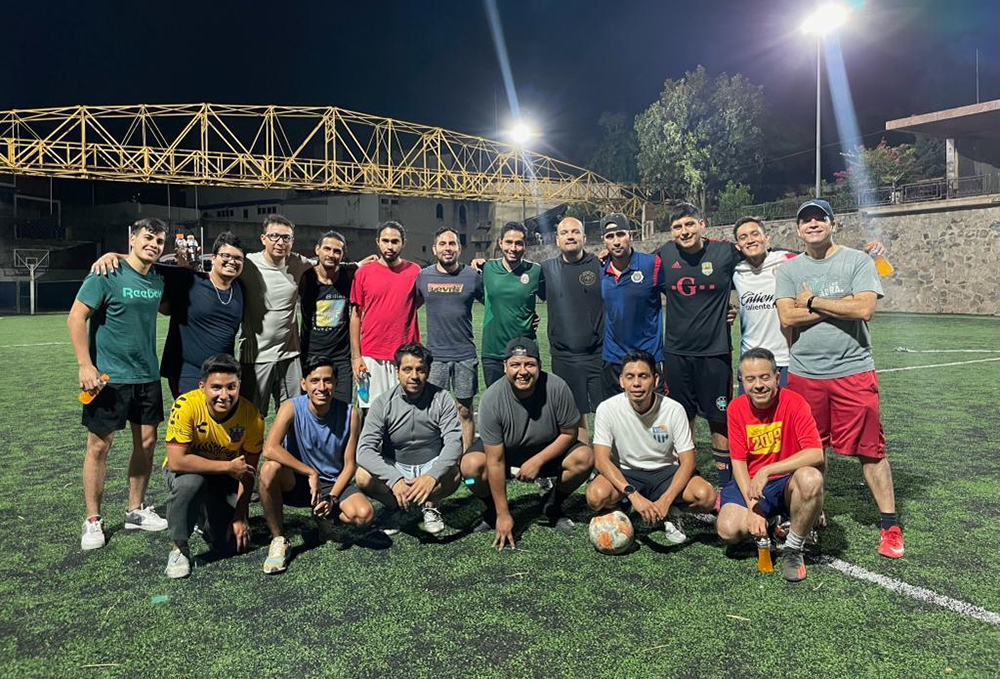
Part of the “Caminos” group from the Friendly Church in Guadalajara, in northern Mexico pose for a photo after playing soccer as part of social activities to get to know each other better and inviting new friends. [Photo: Courtesy of Carlos Piñon]
“The manual will be an important resource to follow in the rest of the IAD territory”, Ruiz said. It is expected to be available before the end of 2024.

Group from Before & After congregation in San Salvador, El Salvador hold a packaged snacks they will distribute during a community impact activity in the community. [Photo: Courtesy of Johnatan Peñate]
Module training during the past two years has included sessions with Pastors Kleber Gonçalves; Johnathan Contero (until recently, pastor at Iglesia Cero in Madrid, Spain); Bledi Leno, director of the Global Mission Urban Center; and Gerson Santos, ministerial association associate director of the General Conference.

Johnathan Contero who was until recently, pastor at Iglesia Cero in Madrid, Spain, leads a discipleship seminar to the group of pastors of Friendly Churches throughout the Inter-American Division. The fourth training module took place earlier this year in Cancun, Mexico.[Photo: Libna Stevens/IAD]